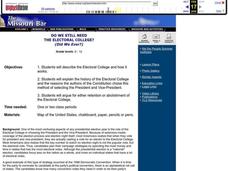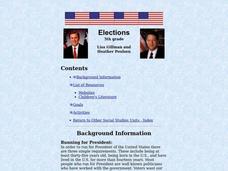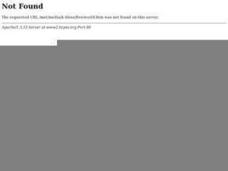Carolina K-12
Exploring the Electoral College
Does your vote really count? This activity helps young voters learn about the electoral college through a TED talk, a helpful handout, discussion prompts, and then a role-playing activity that has participants simulating an election on a...
Encyclopedia Britannica
Electoral College Philosophical Chairs Debate
Because of the Electoral College, it is possible to win the popular vote in a US Presidential election and still lose the election. After researching the pros and cons of the Electoral College, class members engage in a structured debate...
City University of New York
Electoral College
A presidential election is a lot like the 2004 World Series, and it's also a lot like choosing an orange in a paper bag. Apply the process of the electoral college to these two analogies with a set of lessons about government...
Curated OER
Do We Still Need the Electoral College?
One of the most confusing aspects of any presidential election year is the role of the Electoral College. Learners read a bit about how the Electoral College works and then they hold a mock election in their classroom. They'll redraw a...
Constitutional Rights Foundation
270 Votes to Win: The Electoral College in the United States
What exactly is the Electoral College and how does it work? The lesson is part of a larger series on government that explains what the Electoral College is and how it helps determine an election winner. Academics participate in...
Curated OER
Tally of the 1824 Electoral College Vote
Twelfth graders study the parts of the Constitution that address presidential election. They complete a variety of activities designed to spark debate about the flaws in the Electoral College system.
City University of New York
Presidential Elections and the Electoral College
To understand the controversy surrounding the US 2000 presidential election, class members investigate the rationale behind the Electoral Collage, the intimidation involved in the election of 1876, and the 2004 American League...
Curated OER
The Electoral College
Students examine the Electoral College's role in the election process. They conduct Internet research, and identify the elections in which the Electoral College played a deciding role.
Curated OER
Electoral College Policy Brief to the Virginia Governor\ Electoral College Policy Brief to the Virginia Governor
Eighth graders examine the voting process for the President of the United States. In this American Government lesson, 8th graders research the viewpoints on this system. Students participate in a debate on this process.
Curated OER
The Final Countdown
Students examine the United States electoral college system as it applies to the 2004 presidential election. They investigate the impact of the twelve battleground states in the 2004 election and develop informative pamphlets on the...
Curated OER
Electoral Process and Political Leadership
Students analyze voting issues. In this Bill of Rights lesson, students read articles regarding the election of 1824, government in ancient Rome, and lack of voter participation. Students discuss their impressions of each of the articles.
Heritage Foundation
The House of Representatives
The House of Representatives has a lot of responsibility in the United States government. But how did it all begin, and why is it the way it is now? A comprehensive lesson answers all of these questions about the US Constitution and...
Curated OER
Elections in America
Eleventh graders examine the election process in America. For this US Government lesson, 11th graders analyze the problems with the Electoral College. Students research a specific state and create a state flash card in regards to the...
Curated OER
Campaign 2004: Classroom Electorate
Learners role play as political analysts first forecasting the electoral college vote in a presidential election and then, following the results of the actual count. They study the role of swing states, and why political participation is...
Curated OER
Reviewing the Election Process by NOW Classroom for PBS
Students take a closer look at presidential elections. In this election process lesson plan, students discuss the roles of the primary, caucus, polls, Electoral College, delegates, and lobbyists in the process. Students then access the...
Constitutional Rights Foundation
Winner-Take-All: The Two-Party System
Two's company, three's a crowd. High school historians learn about the Electoral College, a two-party, winner-take-all voting system in the United States. The lesson explains the pros and cons of the two-party system, roadblocks for...
Curated OER
Presidential Campaigning
Eighth graders participate in a simulated presidential campaign by conducting research on the Internet. They define a party platform, run a campaign and write and deliver speeches in teams. Students can then act as the electoral college...
Curated OER
The 1932 Election: A Turning Point in History
Students discuss the presidential election in 1932. In this U.S. history lesson, students compare and contrast the differences between the Hoover administration and the administration of FDR. Students work in groups and present the...
Curated OER
Elections
Fifth graders examine the voting process, the electoral college and the voting process. They identify qualities important to a president. They fill out ballot sheets and study the registration forms.
Curated OER
Election 2000
Students review the 2000 presidential election. Students write an expository essay in response to the following: Should the election process in the United states be changed?
Curated OER
The World Almanac for Kids
Fifth graders identify and compare the features of The World Almanac for Kids in the print form and in the CD-ROM/ on-line form. They predict which format is the easiest to access and the most informative, then draw conclusions from...
John F. Kennedy Presidential Library & Museum
Red States/Blue States: Mapping the Presidential Election
Young historians investigate how voting patterns have changed by comparing the outcome of the 1960 election to the outcome of the recent election. A creative final assessment has participants making a news show wherein they provide...
Curated OER
Proportional Representation: A Fairer Voting System?
Tenth graders work as a grade to conduct a mock election. They tally votes in two different systems and discuss if proportional representation or straight counting of votes leads to a fairer outcome.
Curated OER
Following the Leaders
Examine the historic election of Pope Benedict XVI and reflect on the challenges he faces as the new leader of the Catholic Church. This New York Times lesson investigates how other world leaders are chosen in different forms of...

























